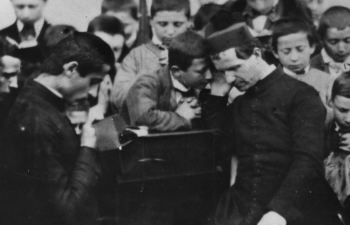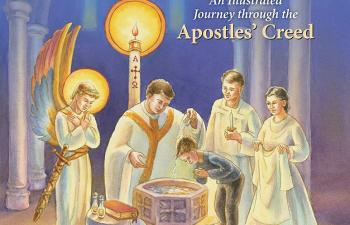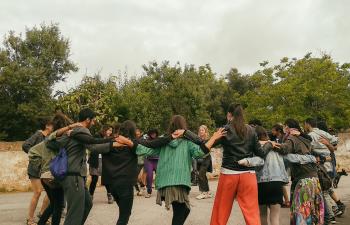 As the catechetical team and I were packing up, one of the quieter teens asked if I was available to talk. I was exhausted, and the last thing I wanted to do was to strike up a new conversation; however, I gathered my strength, said a quick prayer for patience and presence, and sat down at a table in the cafeteria. She said, “My mom has breast cancer, Kristin. What if she dies?” Tears began flowing, and her head fell into her hands. This was not going to be a one minute conversation, but then, most of the important conversations aren’t.
As the catechetical team and I were packing up, one of the quieter teens asked if I was available to talk. I was exhausted, and the last thing I wanted to do was to strike up a new conversation; however, I gathered my strength, said a quick prayer for patience and presence, and sat down at a table in the cafeteria. She said, “My mom has breast cancer, Kristin. What if she dies?” Tears began flowing, and her head fell into her hands. This was not going to be a one minute conversation, but then, most of the important conversations aren’t.
To serve a young person who has come to us in crisis, the primary task of pastoral response is to remember who and whose we are and to remain grounded in our personal relationship with Christ. We need to maintain a prayerful heart and a peaceful, non-anxious presence and recognize that this young person is in the arms of Christ as she struggles. Our role in this situation is limited. We must pray consistently and intentionally during the conversation. Today’s adolescents ache to have someone to listen to their stories, especially when they find themselves in crisis. By being present to young people in the moment, we strengthen them for the road ahead.
As I sat at the cafeteria table, my instinct was to share about my own experience of learning that my mother had breast cancer and to talk to her about the information I have regarding breast cancer. I reminded myself, though, that the second task of pastoral response is to listen. When a young person finds she is in a situation for which she has little or no context, she most needs someone to provide “graceful presence” in the immediate moment. There will be time for advice and information later. This moment was about her family and her fears, not my experiences and stories. We need to remember to ask open-ended questions and keep the focus on their experiences. By valuing their stories, we can show them that we see them as valuable.
I also instinctively desired to become pro-active and do something to assist, but I had to remind myself that though as caregivers and disciples, we are often called to serve others in crisis through active program coordination, and while organizing casserole deliveries for the family or creating a fundraiser to assist with bills that may arrive are helpful, they would need to come later. In the moment, while sitting in the cafeteria, I was being asked to actively listen instead of actively plan.
After the young person has fully shared her story, then together we can begin to explore next steps. She could easily have shared this with a peer or an adult who is a non-believer. Instead, she chose me, an adult who speaks openly and lovingly about the Lord. In these situations, I always offer to pray with and for the young person. She may be struggling to hear the voice of God amidst the storm she is experiencing. Tragic things happen to innocent people. In the face of these challenging situations, we may not have answers. We can, however, bear witness to the truth that God loves each of us even in the worst storms.
One of our core responsibilities in catechesis and youth ministry is to provide avenues to strengthen families. As the young person prepares to return home to her family, it is important to recommend that she share with her parents what she shared with me in the cafeteria. In an age of parent-teen text conversations, face-to-face open communication is a beautiful gift. Too often, family members go outside of the family to seek strength, unity, and identity. As catechists and youth ministers, we are aware that the Church unequivocally declares parents to be “primary educators in the faith” and the family to be a “locus of catechesis.”[i] By aiding and assisting parents, those of us who work with adolescents are able to strengthen the “domestic church.”
That night, after we had prayed together, the young woman left to go home. Her mother would still have cancer when she got home. I could not assure her with certainty that her mother would live through the battle she was undertaking. I could, however, reassure her that the community of faith that she was a part of would stand with her and listen to her throughout the battle to come. As she left, she knew she was not alone. I rose from the cafeteria table grateful and humbled that I was invited into that moment. In the extra “minute,” she had experienced that Christ, and Christ’s Church, were walking with her family on the journey.
Dr. Kristin Witte received her doctorate from Catholic University with a focus on the integration of crisis response and Roman Catholic theology and ritual. She coordinates domestic Catholic educational engagement for Catholic Relief Services.
Note
[i] Congregation for the Clergy, General Directory for Catechesis, art. 255.
This article was originally on page 42 of the printed edition.
This article is from The Catechetical Review (Online Edition ISSN 2379-6324) and may be copied for catechetical purposes only. It may not be reprinted in another published work without the permission of The Catechetical Review by contacting [email protected]



















